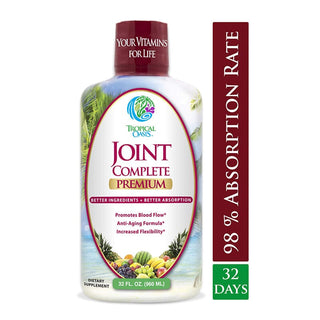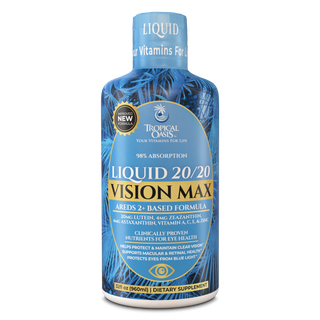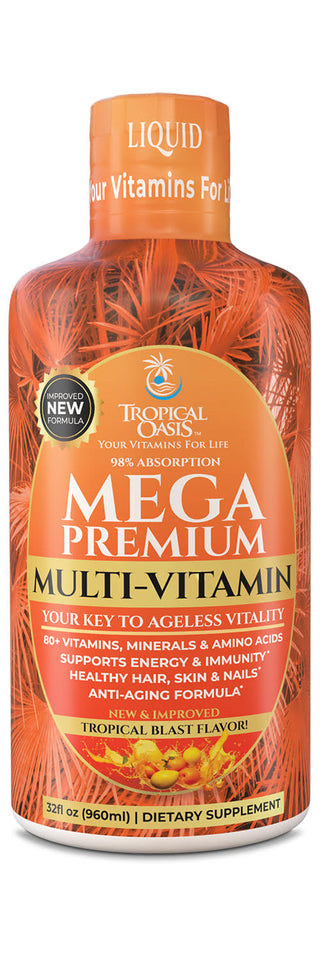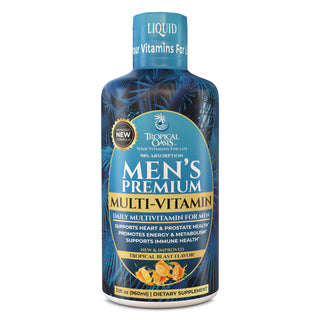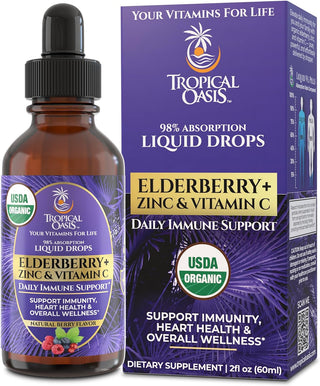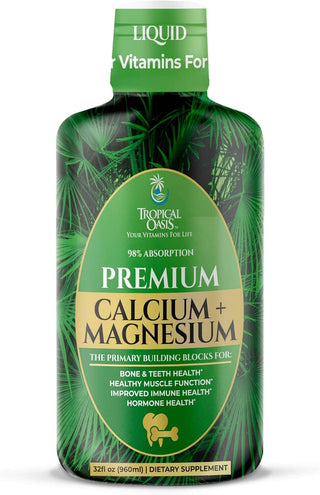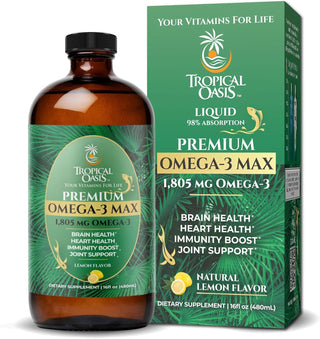Best Multivitamin For Men Over 50
At Tropical Oasis, we pride ourselves on crafting premium liquid multivitamins that are not only easy to take but are also scientifically formulated to maximize nutrient absorption. Our commitment to using high-quality ingredients, including colloidal trace minerals sourced directly from the Great Salt Lake River Valley, ensures that our products stand out in the crowded supplement market.
Organic Liquid Vitamin Elderberry Drops with Vitamin C and Zinc for Adults & Kids
$24.95
- Unit price
- /per
You’re viewing 1-7 of 7 products
Key Takeaways:
- Essential Nutrients: Identifying key nutrients in multivitamins for men over 50 is vital for maintaining health and preventing deficiencies.
- Targeted Health Benefits: Choosing the right multivitamin addresses specific health concerns like bone density, energy, and cognitive function.
- Daily Routine Integration: Incorporating a multivitamin into your daily routine supports overall well-being and complements a balanced diet.
Why Men Over 50 Need A Multivitamin
As men age, their nutritional needs change significantly. After the age of 50, the body’s ability to absorb certain nutrients decreases, and health risks such as heart disease, osteoporosis, and cognitive decline become more prevalent. A multivitamin tailored specifically for men over 50 can help bridge the gap between dietary intake and nutritional needs, ensuring that the body gets essential vitamins and minerals that might be lacking in the diet. Additionally, these multivitamins often contain higher doses of nutrients like vitamin D, calcium, and B vitamins, which are crucial for bone health, energy production, and maintaining overall vitality as men age.
Key Nutrients To Look For In A Multivitamin For Men Over 50
When choosing a multivitamin for men over 50, it’s essential to focus on specific nutrients that support aging health. Here are some key vitamins and minerals to look for:
Vitamin D
Crucial for bone health and immune function, vitamin D plays a significant role in helping the body absorb calcium and maintain bone density. This is especially important as men age, as the risk of fractures and osteoporosis increases. Additionally, vitamin D supports immune function, reducing the risk of infections and chronic diseases.
Vitamin B12
As men age, their ability to absorb vitamin B12 from food naturally decreases, making supplementation more important. Vitamin B12 is essential for maintaining healthy nerve cells and producing DNA, which is vital for overall cellular health. Without adequate B12, men may experience fatigue, cognitive decline, and megaloblastic anemia, which can severely impact quality of life.
Calcium
Calcium is a key mineral for maintaining bone strength, particularly when paired with vitamin D, which aids its absorption. As men age, bone density tends to decrease, leading to a higher risk of osteoporosis and fractures. Ensuring adequate calcium intake helps prevent these issues, maintaining strong and healthy bones well into older age.
Magnesium
Magnesium is involved in over 300 biochemical reactions in the body, making it a vital mineral for overall health. It supports muscle and nerve function, regulates blood pressure, and helps maintain a steady heartbeat. As men over 50 are at increased risk for heart disease and muscle loss, magnesium is an essential nutrient to keep these systems functioning optimally.
Zinc
Zinc plays a critical role in supporting immune function, promoting wound healing, and ensuring proper taste and smell. As men age, their immune system can weaken, making them more susceptible to infections and illnesses. Adequate zinc intake helps bolster the immune system, while also playing a role in cellular repair and maintenance.
Omega-3 Fatty Acids
Although not always included in multivitamins, Omega-3 fatty acids are essential for heart health, reducing inflammation, and supporting cognitive function. These fatty acids help lower triglycerides, reduce the risk of heart disease, and may protect against age-related cognitive decline. Including Omega-3s in your diet or as a supplement is beneficial for maintaining cardiovascular and brain health as you age.
Antioxidants (Vitamins C and E)
Antioxidants like vitamins C and E protect cells from damage caused by free radicals, which are unstable molecules that contribute to aging and the development of chronic diseases. Vitamin C is also crucial for skin health and the immune system, while vitamin E supports eye health and reduces inflammation. Together, these antioxidants help mitigate the effects of aging and keep your body functioning optimally.
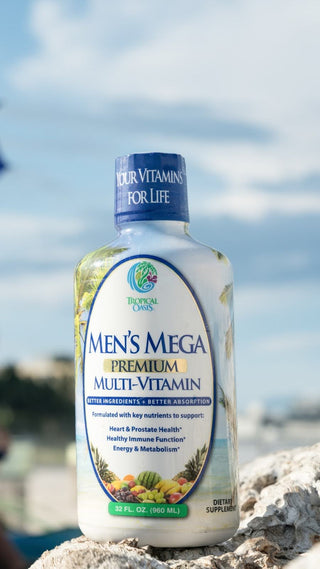
How To Incorporate Multivitamins Into Your Daily Routine
Incorporating a multivitamin into your daily routine can be straightforward, but consistency is key to reaping the benefits. Here are some tips on how to do it effectively:
- Choose the Right Time: Take your multivitamin at a time that suits your schedule and ensures the best absorption. Many people prefer taking it with breakfast to help their body absorb fat-soluble vitamins (like vitamins A, D, E, and K) more effectively. Others find it easier to remember if they take it with their morning coffee or another daily habit.
- Pair with Food: Taking your multivitamin with a meal can help prevent nausea, a common issue when taking vitamins on an empty stomach. Food also aids in the absorption of certain vitamins and minerals.
- Set a Reminder: It’s easy to forget to take your multivitamin, especially when you’re busy. Set a daily reminder on your phone or place the bottle in a visible spot, like next to your coffee maker or toothbrush, to help you remember.
- Stick to the Recommended Dosage: More isn’t always better when it comes to vitamins. Stick to the recommended dosage on the label unless advised otherwise by your doctor. Taking too much of certain vitamins can lead to adverse effects.
- Be Consistent: The benefits of multivitamins come from regular, long-term use. Make taking your multivitamin a part of your daily routine, and try not to skip days.
- Monitor Your Health: Pay attention to how you feel after starting a multivitamin regimen. If you notice any unusual symptoms or side effects, consult your doctor to ensure the supplement is right for you.
Incorporating these practices will help you get the most out of your multivitamin and support your overall health and well-being.
Men's Mega Multivitamin: Optimal Nutritional Support for Men Over 50
Tropical Oasis offers the Men's Mega Multivitamin as one of the best options for men over 50. This multivitamin is designed to provide a comprehensive range of vitamins and minerals tailored to support the nutritional needs of older men. It includes antioxidants, energy boosters, and nutrients that support heart, brain, and eye health, which are crucial for men in this age group.
How To Choose The Right Multivitamin
Selecting the right multivitamin for men over 50 involves considering several factors to ensure it meets your specific health needs. Here’s what to keep in mind:
Check The Label
When selecting a multivitamin, it’s essential to thoroughly examine the label to ensure it contains all the critical nutrients for men over 50, such as vitamins D, B12, calcium, magnesium, and zinc. These nutrients are vital for bone health, energy production, immune function, and more. Additionally, pay attention to the dosage of each nutrient to ensure they are appropriate for your age and health needs, as too much or too little can be ineffective or even harmful.
Consider Your Diet
Your current diet plays a significant role in determining which multivitamin is best for you. If your diet is already rich in certain nutrients like calcium or vitamin D, you may not need a multivitamin with high levels of these components. Instead, focus on a multivitamin that complements your diet by filling in the gaps where you may be lacking, ensuring a balanced nutrient intake without risking overconsumption of certain vitamins and minerals.
Look For Whole-Food Based Options
Multivitamins made from whole-food sources are often more easily absorbed by the body because they contain nutrients in their natural form, which can be gentler on the stomach and more bioavailable. These multivitamins may also include additional phytonutrients from fruits and vegetables, offering a broader spectrum of nutritional benefits. Opting for a whole-food based multivitamin can provide you with a more holistic approach to supplementation, closely mimicking the way nutrients are obtained from real foods.
Evaluate The Form Of Nutrients
Not all forms of vitamins and minerals are created equal; some are more bioavailable, meaning they are more easily absorbed and utilized by the body. For example, vitamin D3 is preferred over D2 because it’s more effective at raising and maintaining vitamin D levels in the blood. Similarly, methylcobalamin, a form of vitamin B12, is more readily absorbed and retained in the body compared to cyanocobalamin, making it a better option for supplementation, especially for men over 50.
Check For Allergens And Additives
If you have food sensitivities, allergies, or dietary preferences, it’s crucial to select a multivitamin that is free from common allergens such as gluten, dairy, and soy. Additionally, many multivitamins contain unnecessary additives, fillers, or artificial colors that can cause adverse reactions or be harmful over time. Choosing a clean, allergen-free multivitamin ensures you get the nutrients you need without unwanted ingredients that could compromise your health.
Consult With Your Doctor
Before starting any new supplement, it’s important to discuss it with your healthcare provider, particularly if you have pre-existing health conditions or are on medications that might interact with certain vitamins or minerals. Your doctor can provide personalized advice based on your health status, ensuring that the multivitamin you choose will complement your existing treatment plan. This step is crucial to avoid potential complications and to optimize the benefits of the multivitamin for your specific needs.
Read also:
- Top Vitamins That Boost Your Energy Levels Naturally
- Organic Vitamins: Everything You Need to Know for Better Health
- Understanding B12 and B Complex: Differences and Benefits
Sources:
- National Institutes of Health. (2017). Office of Dietary Supplements - Multivitamin/mineral Supplements. Nih.gov. https://ods.od.nih.gov/factsheets/MVMS-HealthProfessional/
- Can daily multivitamin supplements help you live longer? (2024, June 28). Www.medicalnewstoday.com. https://www.medicalnewstoday.com/articles/multivitamins-may-not-help-you-live-longer
- Harvard Health Publishing. (2014, March 12). Do multivitamins make you healthier? - Harvard Health. Harvard Health; Harvard Health. https://www.health.harvard.edu/mens-health/do-multivitamins-make-you-healthier
- Richards, L. (2024). 8 Best Multivitamins for Men Over 50 in 2024. Medicalnewstoday.com. https://www.medicalnewstoday.com/articles/best-multivitamin-for-men-over-50
Frequently Asked Questions
While it's possible to get most nutrients from a balanced diet, men over 50 may struggle to absorb certain vitamins and minerals due to aging. A multivitamin can help ensure they receive adequate nutrition to support overall health.
Yes, taking a multivitamin daily is generally safe for men over 50, especially when taken according to the recommended dosage. It helps fill nutritional gaps and supports overall health, but it’s always best to consult with a doctor before starting any supplement regimen.
Multivitamins for men over 50 are formulated with specific nutrients that are more beneficial for aging bodies, such as higher levels of vitamin D, B12, and calcium, and often lower levels of iron, which older men typically need less of.
Yes, some multivitamins for men over 50 include nutrients like selenium and vitamin E, which are thought to support prostate health. However, more research is needed, and these should be taken as part of a comprehensive approach to prostate care.
Generally, men over 50 should avoid multivitamins with iron unless specifically advised by a doctor, as their iron needs decrease with age and excess iron can accumulate in the body, leading to potential health issues.
Yes, a multivitamin can help boost energy levels by addressing deficiencies in key nutrients like B vitamins, which play a critical role in energy production. However, it should complement a healthy diet and lifestyle.

